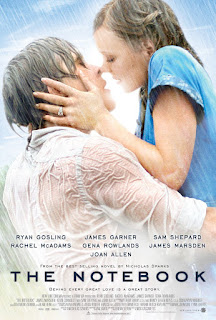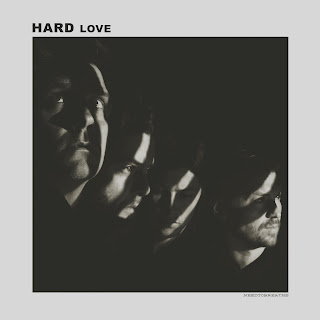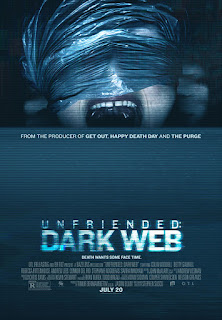Why The Notebook is actually good.
Warning: I will minorly spoil this movie in this post.
I have this thing with romance movies, that thing being that most of them are really, really not good. There is a definite formula to the genre that I think is becoming so overused that any film eschewing it for something different (*cough*Silver Linings Playbook*cough*) becomes one of the best of the genre in my mind. I kind of wish this wasn't the case, especially now that I am in a very committed relationship with someone who happens to love these movies.
However, a couple of weeks ago, my girlfriend somehow got me to actually sit down and watch The Notebook with her, and I realized something about this formula: there's a reason it's there, and I'd like to bet that that reason is The Notebook. It was successful among audiences, bringing in over five times its budget at the box office, as well as garnering a bit of a cult following in the years since its release. People love the unabashed sentimentality of the film, as well as its ebbing and flowing storyline that makes sure the viewer is on the edge of their emotional seat all the way through the end.
Here's the problem, though: that's not what makes The Notebook good. The Notebook is good because of how it tells its story. I haven't seen another true romance film that has told its story in a nonlinear fashion like this one. Now, some nonlinear films can feel a bit forced because the story being told doesn't particularly deserve the treatment, but The Notebook surprisingly adeptly weaves itself between the past and present. The film in a way sets itself up for its ending but not in the way I thought it would. I actually knew that it was told in a non-linear flashback format before watching it, so I presumed that that reveal would be saved for later in the film's runtime. Instead, The Notebook does the smartest thing ever and gives this away about halfway through, letting the ending unfold as a sort of "will they or won't they" but with far more consequences than that phrase usually carries.
That's another thing The Notebook gets right: it deals with a lot heavier material than most romance films. Instead of simply dealing with the typical tropes of relationships like so many others of its genre, The Notebook tackles some very large items, most notably mental illness, as it tells its story. Yes, other films have done this and quite often, but the fact is that The Notebook came before those others (i.e., The Fault in Our Stars, Silver Linings Playbook). That doesn't make it any better, but it does make it a more risky proposition than its followers.
The last good thing about The Notebook I'll mention here are all the cinematic qualities. No, this movie isn't a perfectly made cinematic masterpiece, but it does get a lot of the pieces of the puzzle to fit decently well. There isn't much remarkable about the directing, but I do like how I can distinctly feel a shift from the warm memories of the past to the cold reality of the future. The performances from Ryan Gosling and Rachel McAdams aren't perfect, but they do have enough quality to carry the film through its running time. The script is a little simple, but there's still a lot of good writing moments for the characters.
Essentially, here's what my thoughts on The Notebook boil down to: it's good. It's not great, it's not bad; just good. Part of this is because it came before a lot of the films that take after it, but there actually are some genuinely unique things that The Notebook does with its storytelling that most other romance films don't do. This makes it a worthwhile watch, no matter what your relationship status might be.
My recommendation: It's worth watching. And guys, don't cry when your girlfriend makes you watch it.
My grade: 71
I have this thing with romance movies, that thing being that most of them are really, really not good. There is a definite formula to the genre that I think is becoming so overused that any film eschewing it for something different (*cough*Silver Linings Playbook*cough*) becomes one of the best of the genre in my mind. I kind of wish this wasn't the case, especially now that I am in a very committed relationship with someone who happens to love these movies.
However, a couple of weeks ago, my girlfriend somehow got me to actually sit down and watch The Notebook with her, and I realized something about this formula: there's a reason it's there, and I'd like to bet that that reason is The Notebook. It was successful among audiences, bringing in over five times its budget at the box office, as well as garnering a bit of a cult following in the years since its release. People love the unabashed sentimentality of the film, as well as its ebbing and flowing storyline that makes sure the viewer is on the edge of their emotional seat all the way through the end.
Here's the problem, though: that's not what makes The Notebook good. The Notebook is good because of how it tells its story. I haven't seen another true romance film that has told its story in a nonlinear fashion like this one. Now, some nonlinear films can feel a bit forced because the story being told doesn't particularly deserve the treatment, but The Notebook surprisingly adeptly weaves itself between the past and present. The film in a way sets itself up for its ending but not in the way I thought it would. I actually knew that it was told in a non-linear flashback format before watching it, so I presumed that that reveal would be saved for later in the film's runtime. Instead, The Notebook does the smartest thing ever and gives this away about halfway through, letting the ending unfold as a sort of "will they or won't they" but with far more consequences than that phrase usually carries.
That's another thing The Notebook gets right: it deals with a lot heavier material than most romance films. Instead of simply dealing with the typical tropes of relationships like so many others of its genre, The Notebook tackles some very large items, most notably mental illness, as it tells its story. Yes, other films have done this and quite often, but the fact is that The Notebook came before those others (i.e., The Fault in Our Stars, Silver Linings Playbook). That doesn't make it any better, but it does make it a more risky proposition than its followers.
The last good thing about The Notebook I'll mention here are all the cinematic qualities. No, this movie isn't a perfectly made cinematic masterpiece, but it does get a lot of the pieces of the puzzle to fit decently well. There isn't much remarkable about the directing, but I do like how I can distinctly feel a shift from the warm memories of the past to the cold reality of the future. The performances from Ryan Gosling and Rachel McAdams aren't perfect, but they do have enough quality to carry the film through its running time. The script is a little simple, but there's still a lot of good writing moments for the characters.
Essentially, here's what my thoughts on The Notebook boil down to: it's good. It's not great, it's not bad; just good. Part of this is because it came before a lot of the films that take after it, but there actually are some genuinely unique things that The Notebook does with its storytelling that most other romance films don't do. This makes it a worthwhile watch, no matter what your relationship status might be.
My recommendation: It's worth watching. And guys, don't cry when your girlfriend makes you watch it.
My grade: 71




Comments
Post a Comment